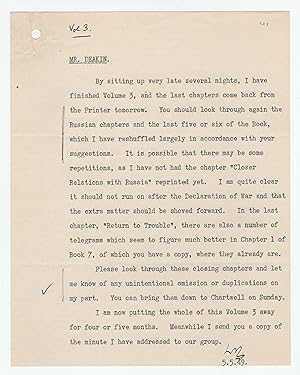About this Item
This typed 1949 memorandum initialed by Winston S. Churchill to his literary assistant William Deakin concerns editing of the third volume of Churchill s Second World War memoirs, testifying to both the indispensability of Deakin and the detailed, granular diligence Churchill applied to his writing. This Memorandum is specifically referenced and quoted in Churchill s official biography (Gilbert, Vol. VIII, p.474).The memorandum, typed on the recto of a watermarked, laid paper sheet, is addressed in underlined capitals "MR. DEAKIN." Churchill writes "By sitting up very late several nights, I have finished Volume 3, and the last chapters come back from the Printer tomorrow. You should look through again the Russian chapters and the last five or six of the book, which I have reshuffled largely in accordance with your suggestions." Churchill calls Deakin s attention to the possibility of "repetitions" and the notional shifting of material among chapters. Churchill asks Deakin "Please look through these closing chapters and let me know of any unintentional omission or duplications on my part. You can bring them to Chartwell on Sunday." In closing Churchill tells Deakin "I am now putting away the whole of this Volume 3 away for four or five months." The letter is initialed "WSC" by Churchill, just above the typed date "5.5.49." Someone presumably Deakin wrote "Vol 3." at the upper left. There are vertical pencil lines in the left margin beside the two places where Churchill made specific requests, as well as a check mark beside Churchill s terminal request, indicating a task completed. Condition of the letter is fine, with two horizontal folds, ostensibly from original posting, and a single circular hole punched at the upper left, ostensibly for filing.Frederick William Dampier "Bill" Deakin (1913-2005) was an Oxford fellow and lecturer. He first served Churchill as a research assistant for three years preceding the Second World War. Churchill described him in a 15 February 1939 letter as "a young man of great historical distinction" and wrote of him on 15 February 1939 "I can say from my own intimate knowledge of him for several years that he is in every way fitted to make an excellent officer." Churchill proved right; during the war, Deakin served with Special Operations, notably in Yugoslavia with Tito s partisans, earning a DSO. After the war, Deakin served as Director of Researches for Churchill from 1946-1949 - the time from which this letter dates. Deakin later became the first Warden of St. Antony s College, Oxford (1950-58), and was knighted in 1975.After Churchill lost his premiership to Labor s electoral landslide in late July 1945, on 4 August Deakin wrote to Churchill from Belgrade "I was away on tour in Croatia when news of the election results came through" and added, providing both levity and political perspective, "The comment of one old lady in Zagreb was Poor Mr Churchill, I suppose that now he will be shot! " Deakin told Churchill "…this political decision can never in any way reflect upon the greatness of your leadership during our darkest moments. You must be proud of that unbeatable record, which stands for all time." Churchill later quipped that he had not been shot, but sentenced to hard labour . The next year, in 1946, Deakin returned to Churchill s service to help write the history of that "unbeatable record".Churchill s closing reference to "our group" is to the literary team that helped him with the mammoth task of researching, writing, and editing The Second World War. Churchill s literary "hands" were known as the "Syndicate", Colonel George Roland Gordon Allen, General Sir Henry Royds Pownall, Bill Deakin, and Denis Kelly chief among them. In the years following the war, even as Churchill undertook the massive project of writing his war memoirs, he remained intent upon his political obligations and aspirations, which explains why he was "so reliant on his assistants." (Reynolds, p.498). Seller Inventory # 007948
Contact seller
Report this item
![]()
